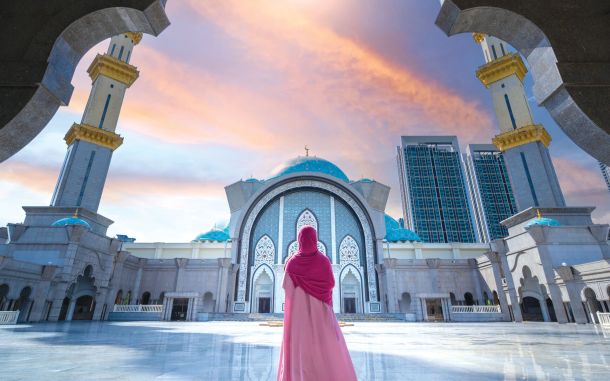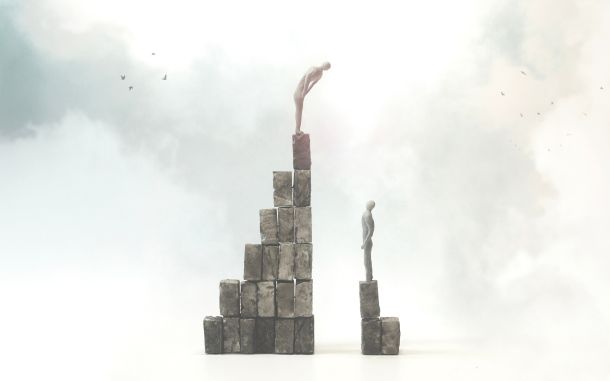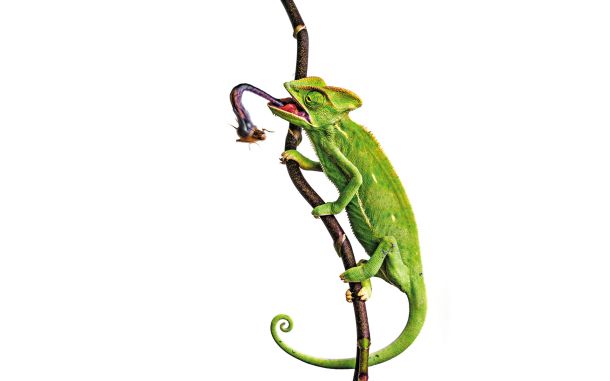Standing at Compassion’s Crossroads

In This Article
-
As a society, it feels like we are standing at a crossroads, forced to choose between clinging to our compassion or allowing ourselves to become increasingly hardened and cruel.
-
Prolonged negativity suppresses the immune system, impairs memory and focus, and increases the risk of anxiety and depression.
-
On one side lies the path of desensitization, where cruelty becomes second nature, and negativity dominates our minds and bodies. On the other side lies the path of humanity—a path of compassion, understanding, and intentional positivity.
“Our human compassion binds us, the one to the other—not in pity or patronizingly, but as human beings who have learned how to turn our common suffering into hope for the future.”
– Nelson Mandela [1]
Scrolling through social media has become part of our daily lives, but lately, it feels less like a connection to the world and more like a window into growing cruelty. This was made painfully clear in the wake of the tragic murder of Brian Thompson, a prominent health insurance CEO [2]. While any loss of life should prompt solemn reflection, the response was instead marked by a disturbing celebration of the violence. Social media was flooded with posts praising the act as a justified rebellion against the perceived flaws in the healthcare system. This reaction not only stripped Thompson of his humanity but also reduced a complex societal issue to a single act of violence. Such responses are a symptom of a broader societal desensitization, where individuals are no longer seen as human beings but as symbols to be attacked or defended. The ability to empathize and mourn is increasingly replaced by a toxic culture of outrage and vindication, making cruelty the norm rather than the exception.
This disturbing reaction reflects a larger societal problem. From viral videos of street violence to indifference toward wars that displace millions, we are constantly exposed to images and narratives that normalize cruelty. The question looms: When did we become so desensitized? At what point did we stop seeing the humanity in one another? As a society, it feels like we are standing at a crossroads, forced to choose between clinging to our compassion or allowing ourselves to become increasingly hardened and cruel.
Our society today is often described as a VUCA world [3], a term first coined by the U.S. Army War College to describe the challenges of the post-Cold War environment. The acronym stands for Volatility, Uncertainty, Complexity, and Ambiguity, and it reflects the unpredictable, fast-changing, and interconnected nature of modern life. These conditions don’t just create stress and anxiety on a personal level; they also lay the groundwork for societal cruelty, desensitization, and polarization.
For example, volatility in how quickly information spreads—often sensationalized or lacking context—creates an environment where people react impulsively, sometimes with cruelty or judgment, rather than empathy or understanding. Uncertainty, such as that surrounding systemic problems like healthcare or economic instability, leaves individuals feeling powerless, prompting them to channel their frustration outward, often toward scapegoats. Complexity arises from the interconnected systems in our digital age, where a single event can spark global outrage or dehumanization, as seen in the online response to the tragic murder of a CEO. Finally, ambiguity makes it difficult to discern facts from misinformation, enabling false narratives that justify or even celebrate acts of cruelty under the guise of righteousness.
These conditions create heightened stress and anxiety, often leading to defensive or reactionary behaviors. The constant bombardment of information and the pressure to adapt swiftly can diminish empathy and foster environments where cruelty and negativity thrive. Social media amplifies these effects by rewarding outrage and divisiveness. Inflammatory posts garner more engagement, creating feedback loops that normalize harshness. In such a chaotic environment, the tendency to externalize frustrations, often through unkind or harmful behaviors, becomes more pronounced. Recognizing the influence of this VUCA framework is crucial in understanding why society seems to be increasingly harsh and polarized.
Cruelty, though, often begins subtly, as an emotional defense mechanism or an outlet for frustration. Psychologists explain that it grows when individuals experience feelings of powerlessness or anger and direct these emotions outward, often targeting those perceived as less powerful or morally culpable. On social media, cruelty thrives because anonymity diminishes empathy. A study on the Social and Psychological Effects of Internet Use [4] revealed that people are far less likely to consider the emotional impact of their words in anonymous online settings.
Over time, cruelty becomes self-reinforcing. Negative interactions release adrenaline and dopamine, creating a temporary sense of power or satisfaction. This reward cycle can make cruelty addictive, as people seek repeated validation through likes, shares, or agreement from others. Left unchecked, cruelty becomes part of a broader culture, perpetuated through social modeling and collective desensitization.
The effects of negativity extend far beyond emotional harm; they have profound physical and neurological consequences. When exposed to negative content—whether through social media, news, or interpersonal interactions—our brains activate the amygdala, the region responsible for processing fear and stress. This initiates the release of stress hormones like cortisol and adrenaline, which are beneficial in short bursts but harmful when sustained. Prolonged negativity suppresses the immune system, impairs memory and focus, and increases the risk of anxiety and depression. A University at Buffalo study found that heavy social media users reported higher levels of chronic inflammation, as indicated by elevated C-reactive protein (CRP) levels, which are linked to conditions like heart disease and diabetes [5]. Additionally, the brain becomes wired to seek negativity, creating a cycle of constant stress and reduced emotional resilience.
These effects are not limited to individuals. They ripple through families, workplaces, and communities, contributing to a culture of heightened stress and reduced emotional well-being. Yet the human brain is remarkably adaptable. Just as it can be conditioned to negativity, it can also be retrained for compassion and positivity—a concept first recognized centuries ago. Zayd Al-Balkhi, a 9th-century scholar and early pioneer in mental health, emphasized the interconnectedness of spiritual, emotional, and physical health. He believed that cultivating positive habits could rejuvenate the soul, counteract emotional decay, and foster resilience long before modern neuroscience confirmed the brain's adaptability [6].
Al-Balkhi recommended practices such as surrounding oneself with uplifting environments, avoiding exposure to negativity, and engaging in regular gratitude reflection. For example, taking time each day to reflect on blessings fosters a sense of joy and contentment, while balancing work and rest helps maintain mental clarity. Modern research aligns with these teachings. At Duke University, researchers found that reflecting on three positive experiences daily significantly improved mood, reduced stress, and enhanced sleep over time [7]. Similarly, a study revealed that even a week of exposure to positive content could increase optimism and reduce stress levels. These findings underscore the transformative power of intentional positivity [8].
Dr. Barbara Fredrickson, a leading researcher in positive psychology, has shown through her “broaden-and-build” theory that positive emotions can expand an individual’s mindset, fostering greater resilience, creativity, and empathy [9]. When individuals practice gratitude, optimism, and mindfulness, they are better equipped to approach others with understanding and kindness. This ripple effect extends beyond personal well-being, influencing how communities interact and respond to challenges. By intentionally creating uplifting environments and modeling compassion, individuals can counteract the culture of negativity and cruelty that permeates modern society. In a world where harshness often dominates, small acts of positivity, informed by both ancient wisdom and modern science, can collectively rebuild societal compassion and encourage a shift toward kindness in both personal and public spaces.
As adults, we hold a profound responsibility to model compassion and empathy for younger generations. Children and teens learn not just from what we say but from how we act. When we engage in online cruelty, speak harshly to others, or fail to demonstrate kindness in our interactions, we normalize these behaviors for them, sending the message that such actions are acceptable. Conversely, when we model patience, understanding, and generosity, we show them that kindness is not a weakness but a strength that builds meaningful relationships and contributes to a better world.
Parenting and education play critical roles in fostering empathy. Teaching emotional intelligence, such as helping children recognize and manage their emotions, can lay the foundation for healthy interpersonal relationships. Schools can incorporate programs that encourage respectful discussions, teach active listening skills, and provide opportunities for collaborative problem-solving. Modeling forgiveness—both in personal relationships and in public disputes—demonstrates that reconciliation is not only possible but essential for emotional and societal well-being.
On a societal level, leaders, influencers, and institutions must champion empathy and create spaces that prioritize understanding over divisiveness. For example, initiatives that bring together individuals from different cultural or socioeconomic backgrounds can help bridge divides and foster mutual respect. Public figures, especially those with significant platforms, have a unique opportunity to set the tone by promoting messages of kindness and demonstrating accountability when mistakes are made. Institutions, from workplaces to community organizations, can implement policies that reward collaboration and inclusivity, fostering environments where empathy thrives.
Furthermore, media and technology companies bear a significant responsibility in shaping the cultural narrative. Algorithms that prioritize outrage and divisiveness could instead be adjusted to amplify positive interactions and constructive dialogue. Campaigns highlighting stories of compassion, resilience, and unity can inspire individuals and communities to choose empathy over hostility. Research from the Greater Good Science Center at UC Berkeley shows that exposure to uplifting stories and acts of kindness increases the likelihood of individuals engaging in prosocial behaviors themselves, creating a ripple effect of positivity [10].
Ultimately, the responsibility to nurture compassion extends to every facet of society. Whether as parents, educators, leaders, or individuals, we must recognize the power of our actions to shape the world that younger generations inherit. By consciously choosing to model empathy and understanding, we can inspire the next generation to build a kinder, more connected, and more compassionate society.
The Quran beautifully reminds us: “And do good as God has done good to you” (Surah Al-Qasas, 28:77). This verse calls us to reflect divine mercy and kindness in our own actions. By embodying these values, we can foster a culture where empathy is not just an ideal but a daily practice.
We are indeed at a crossroads. On one side lies the path of desensitization, where cruelty becomes second nature, and negativity dominates our minds and bodies. On the other side lies the path of humanity—a path of compassion, understanding, and intentional positivity.
The choice we make today will shape not only our lives but also the lives of future generations. In a time increasingly defined by rapid change and uncertainty, our collective actions hold the power to determine whether cruelty or compassion becomes the dominant cultural norm. Every act of kindness, no matter how small, reinforces the value of empathy in our shared human experience. A thoughtful pause before reacting—whether in a heated online discussion or a face-to-face conflict—demonstrates the strength it takes to prioritize understanding over anger. Every decision to amplify positivity over negativity, such as sharing uplifting stories or offering words of encouragement, becomes a ripple in the larger fabric of societal behavior.
When these individual choices are repeated and modeled consistently, they transcend isolated acts and become habits. Together, these habits build a culture where compassion is not just an occasional choice but an ingrained part of daily life. Such a culture fosters resilience, unity, and hope, qualities that are urgently needed in a world fraught with division and despair. By choosing compassion today, we lay the groundwork for a future where kindness is not seen as an exception but as the expectation; a future where generations to come will look back at this moment as the turning point toward a more empathetic and humane society.
Notes
- http://www.mandela.gov.za/mandela_speeches/2000/001206_healing.htm
- https://www.theatlantic.com/ideas/archive/2024/12/astonishing-level-dehumanization/681189/
- https://www.vuca-world.org/where-does-the-term-vuca-come-from/
- https://pmc.ncbi.nlm.nih.gov/articles/PMC4789623/
- https://www.buffalo.edu/news/releases/2022/01/022.html
- https://iamphome.org/abu-zayd-al-balkhis-sustenance-of-the-soul-the-cognitive-behavior-therapy-of-a-ninth-century-physician/
- https://dhwblog.dukehealth.org/reflect-on-three-good-things/
- https://ggsc.berkeley.edu/images/uploads/GGSC-JTF_White_Paper-Gratitude-FINAL.pdf
- https://positivepsychology.com/broaden-build-theory/#:~:text=What%20is%20Fredrickson's%20Broaden%2Dand,their%20personal%20resources%20over%20time.
- https://ggsc.berkeley.edu/images/uploads/GGSC-JTF_White_Paper-Gratitude-FINAL.pdf









